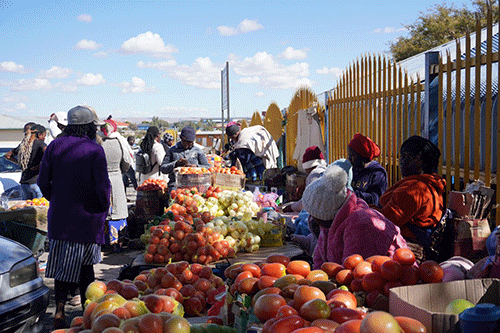Namibia follows global trends in terms of the informal economy’s contribution to overall economic health. This is according to industrialisation and trade minister Lucia Ipumbu, who said it is estimated the informal economy contributes about 24% of the country’s GDP and around 56% of the labour force.
These significant inputs further justify the formalisation of the informal economy.
Iipumbu added the informal economy is, therefore, a key lever for ensuring sustainable livelihoods, as well as innovative and dynamic entrepreneurship, particularly for vulnerable or less educated citizens, such as women and youth, who may have inclusivity limitations in the formal economy.
“Much of our policy work has evolved around the formal enterprise development arena as evidenced by numerous policies about economic incentives, foreign direct investment, as well as formal micro, small and medium enterprises, and newer initiatives, such as special economic zones,” said Ipumbu yesterday during a multi-stakeholder workshop on the national diagnostic of informality.
The trade minister noted that despite the recognised benefits of the informal economy, it is wise to the negative externalities present in its growth and development.
Ipumbu: “The vulnerability of employment in the informal economy may also lead to wage disparities between the formal and informal economies, despite comparable skills leading to economic inequality”.
Speaking at the same event, labour minister Utoni Nujoma said the informal economy plays a vital role in the livelihoods of many Namibians, as it encompasses a diverse range of activities, from street vending to small-scale agriculture, and it touches the lives of countless individuals and families. “It is a source of income, employment and resilience for many – and at the same time, it presents challenges in terms of labour rights, social protection and economic stability. We understand that informality is not a monolithic concept; it is a complex and multifaceted issue that demands a comprehensive approach,” said Nujoma. “Namibia has been designated as a pathfinder country under the UN’s Global Accelerator on Jobs and Social Protection for Just Transitions and a pilot country for the ILO strategy to reduce inequalities in the world of work. The country is focusing on addressing informality, which is a driver of inequality and an obstacle to social justice,” Nujoma added.
Moreover, in a speech read on his behalf, governor of the Bank of Namibia Johannes !Gawaxab concurred with the ministers that as the country steadfastly navigates the path of economic recovery, it is becoming increasingly evident that confronting the issue of informality is vital to attaining sustainable economic growth.
“Over half of the Namibian workforce operates within this sector, with many being women and individuals from our rural communities. The prevalence of informal economic activities and employment tells us there’s more work to be done. We must grasp the intricacies of this and strategise accordingly,” !Gawaxab stated. He added that by integrating the informal sector, Namibians will be empowered, there will be a fostering of entrepreneurship, and lay the groundwork for a more stable economic and financial future.
“Integrating the informal sector will propel the reach of our financial system, allowing many Namibians access to formal financial services and securing their financial futures. Such inclusion not only benefits individuals but holds the potential to boost our national economy and foster resilient economic growth, particularly amidst all too frequent shocks,” !Gawaxab noted.
Meanwhile, UN Resident Coordinator Hopolang Phororo said there are indisputable facts about informality in Namibia today.
“First, despite the country’s commitment to job creation articulated in its macroeconomic policies, the informal economy has gradually expanded to become Namibia’s greatest employer. The available data from the National Labour Survey of 2018 shows that the proportion of informal to total employment in the country stood at 55.8%,” Phororo stated.
She said understanding the spatial dimensions of informality in Namibia -the silver houses – is not only important for effective policymaking but also for inclusive development and strategic investments.
Phororo stated: “In urban areas, such as Windhoek and Walvis Bay, the concentration of informal economic activities, such as informal markets and street vendors, presents opportunities for sustainable growth and financial inclusion”.
She added that by identifying the spatial patterns of informality, policymakers and financial institutions can identify areas with high potential for business development and target investment in infrastructure, access to finance and regulatory frameworks to support the integration of informal economic activities into the formal sector.


